Research: Importance of Quality Management in the NHS, UK Healthcare
VerifiedAdded on 2019/12/03
|22
|6117
|206
Report
AI Summary
This research report delves into the critical importance of quality management within the National Health Service (NHS) in the United Kingdom. The study aims to evaluate the significance of quality management in the health and social care industry, using the NHS as a case study. The research begins with a thorough introduction outlining the rationale for the study, followed by a detailed literature review that explores the meaning, impact, and various aspects of quality management. The report then specifies the research objectives and methodology, including the research questions that guide the investigation. Data collection and analysis are discussed, along with appropriate research evaluation techniques. The report concludes with interpretations, recommendations for improving quality management tools within the NHS, and a comprehensive list of references and an appendix containing a questionnaire. The analysis covers various aspects, including quality planning, assurance, and control, emphasizing the importance of consistency, employee motivation, and brand image within the healthcare sector. The research highlights the impact of quality management on various spheres of business operations, particularly employee performance and stakeholder satisfaction.

Research Project
1
1
Paraphrase This Document
Need a fresh take? Get an instant paraphrase of this document with our AI Paraphraser
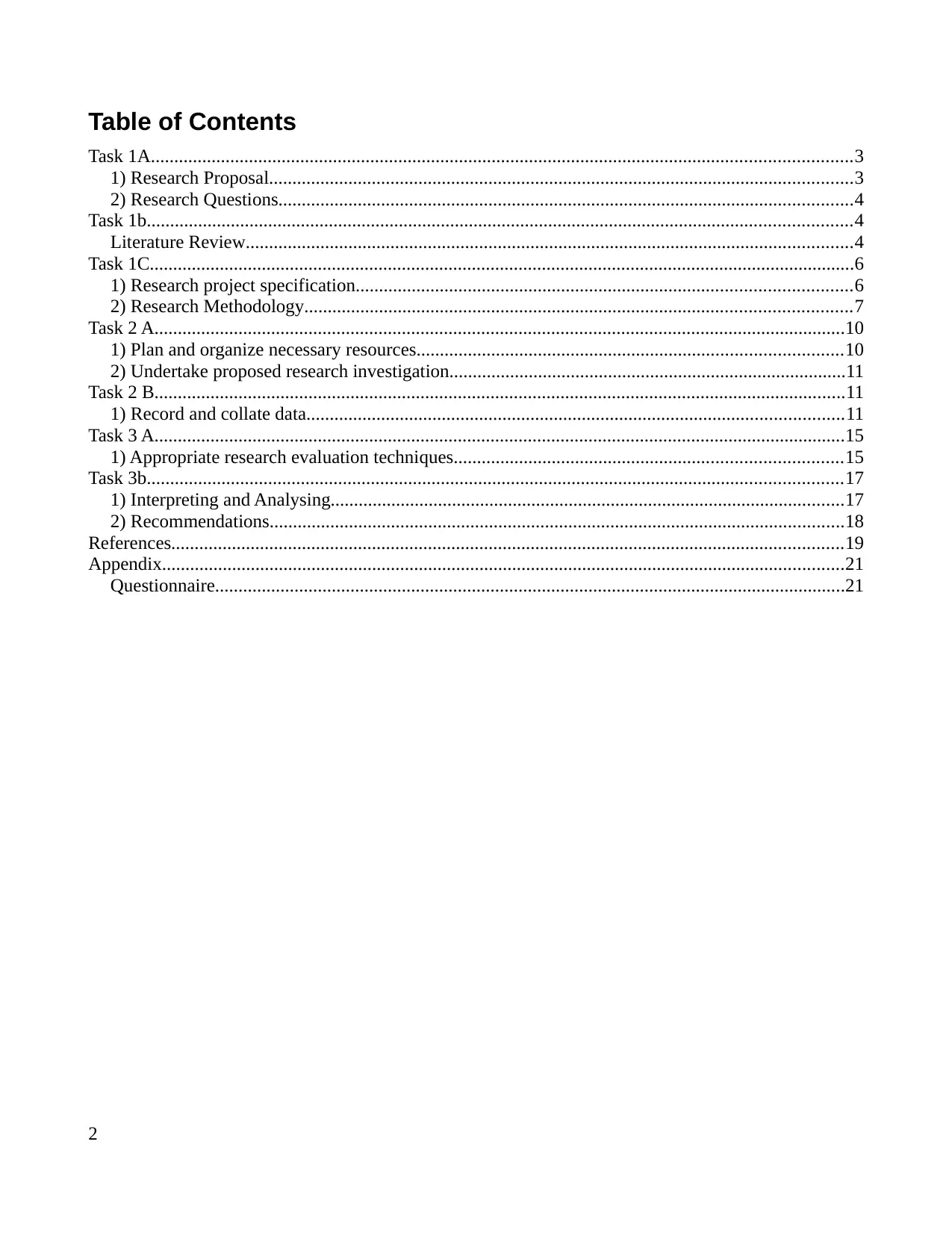
Table of Contents
Task 1A......................................................................................................................................................3
1) Research Proposal.............................................................................................................................3
2) Research Questions...........................................................................................................................4
Task 1b.......................................................................................................................................................4
Literature Review..................................................................................................................................4
Task 1C.......................................................................................................................................................6
1) Research project specification..........................................................................................................6
2) Research Methodology.....................................................................................................................7
Task 2 A....................................................................................................................................................10
1) Plan and organize necessary resources...........................................................................................10
2) Undertake proposed research investigation.....................................................................................11
Task 2 B....................................................................................................................................................11
1) Record and collate data...................................................................................................................11
Task 3 A....................................................................................................................................................15
1) Appropriate research evaluation techniques...................................................................................15
Task 3b.....................................................................................................................................................17
1) Interpreting and Analysing..............................................................................................................17
2) Recommendations...........................................................................................................................18
References................................................................................................................................................19
Appendix..................................................................................................................................................21
Questionnaire.......................................................................................................................................21
2
Task 1A......................................................................................................................................................3
1) Research Proposal.............................................................................................................................3
2) Research Questions...........................................................................................................................4
Task 1b.......................................................................................................................................................4
Literature Review..................................................................................................................................4
Task 1C.......................................................................................................................................................6
1) Research project specification..........................................................................................................6
2) Research Methodology.....................................................................................................................7
Task 2 A....................................................................................................................................................10
1) Plan and organize necessary resources...........................................................................................10
2) Undertake proposed research investigation.....................................................................................11
Task 2 B....................................................................................................................................................11
1) Record and collate data...................................................................................................................11
Task 3 A....................................................................................................................................................15
1) Appropriate research evaluation techniques...................................................................................15
Task 3b.....................................................................................................................................................17
1) Interpreting and Analysing..............................................................................................................17
2) Recommendations...........................................................................................................................18
References................................................................................................................................................19
Appendix..................................................................................................................................................21
Questionnaire.......................................................................................................................................21
2
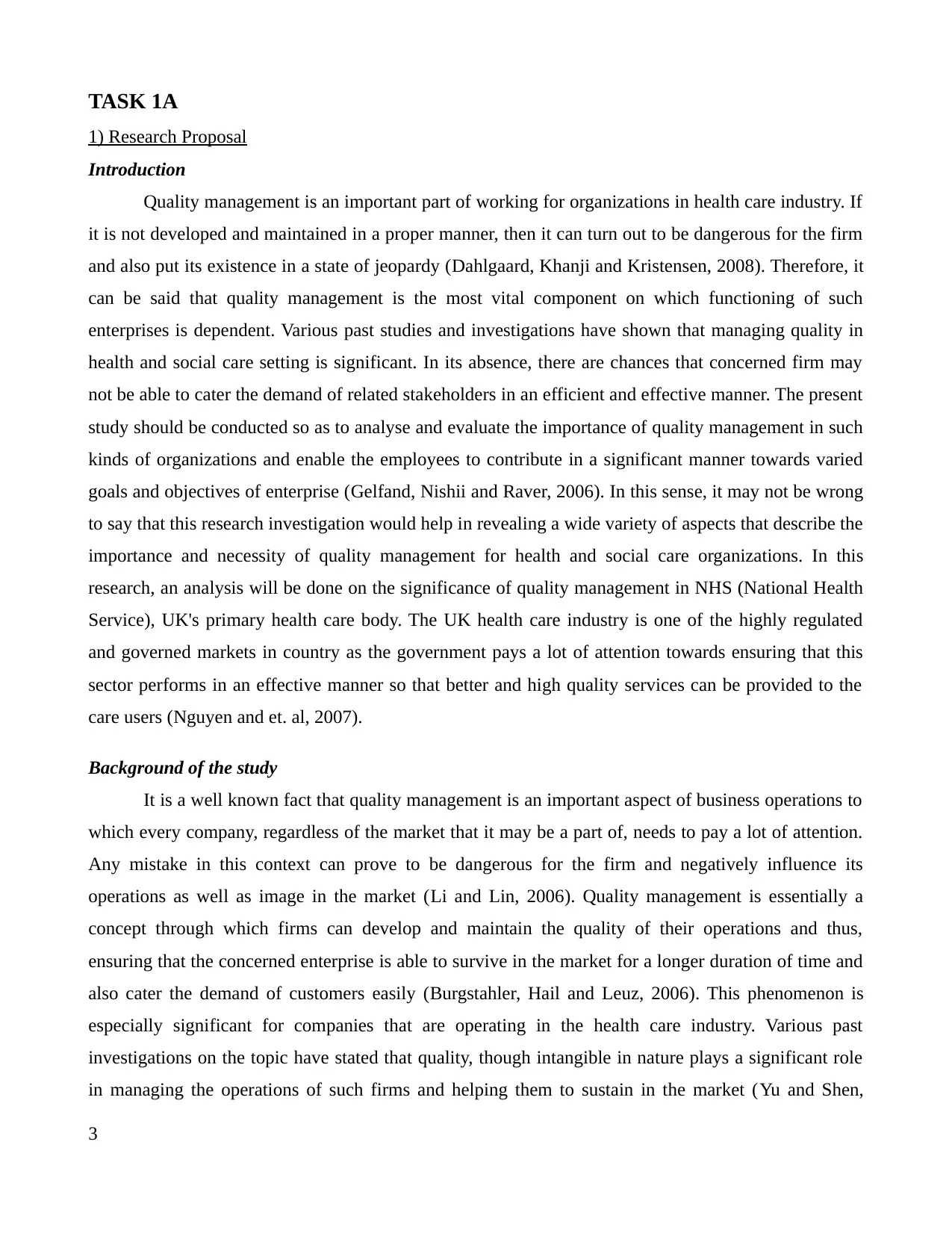
TASK 1A
1) Research Proposal
Introduction
Quality management is an important part of working for organizations in health care industry. If
it is not developed and maintained in a proper manner, then it can turn out to be dangerous for the firm
and also put its existence in a state of jeopardy (Dahlgaard, Khanji and Kristensen, 2008). Therefore, it
can be said that quality management is the most vital component on which functioning of such
enterprises is dependent. Various past studies and investigations have shown that managing quality in
health and social care setting is significant. In its absence, there are chances that concerned firm may
not be able to cater the demand of related stakeholders in an efficient and effective manner. The present
study should be conducted so as to analyse and evaluate the importance of quality management in such
kinds of organizations and enable the employees to contribute in a significant manner towards varied
goals and objectives of enterprise (Gelfand, Nishii and Raver, 2006). In this sense, it may not be wrong
to say that this research investigation would help in revealing a wide variety of aspects that describe the
importance and necessity of quality management for health and social care organizations. In this
research, an analysis will be done on the significance of quality management in NHS (National Health
Service), UK's primary health care body. The UK health care industry is one of the highly regulated
and governed markets in country as the government pays a lot of attention towards ensuring that this
sector performs in an effective manner so that better and high quality services can be provided to the
care users (Nguyen and et. al, 2007).
Background of the study
It is a well known fact that quality management is an important aspect of business operations to
which every company, regardless of the market that it may be a part of, needs to pay a lot of attention.
Any mistake in this context can prove to be dangerous for the firm and negatively influence its
operations as well as image in the market (Li and Lin, 2006). Quality management is essentially a
concept through which firms can develop and maintain the quality of their operations and thus,
ensuring that the concerned enterprise is able to survive in the market for a longer duration of time and
also cater the demand of customers easily (Burgstahler, Hail and Leuz, 2006). This phenomenon is
especially significant for companies that are operating in the health care industry. Various past
investigations on the topic have stated that quality, though intangible in nature plays a significant role
in managing the operations of such firms and helping them to sustain in the market (Yu and Shen,
3
1) Research Proposal
Introduction
Quality management is an important part of working for organizations in health care industry. If
it is not developed and maintained in a proper manner, then it can turn out to be dangerous for the firm
and also put its existence in a state of jeopardy (Dahlgaard, Khanji and Kristensen, 2008). Therefore, it
can be said that quality management is the most vital component on which functioning of such
enterprises is dependent. Various past studies and investigations have shown that managing quality in
health and social care setting is significant. In its absence, there are chances that concerned firm may
not be able to cater the demand of related stakeholders in an efficient and effective manner. The present
study should be conducted so as to analyse and evaluate the importance of quality management in such
kinds of organizations and enable the employees to contribute in a significant manner towards varied
goals and objectives of enterprise (Gelfand, Nishii and Raver, 2006). In this sense, it may not be wrong
to say that this research investigation would help in revealing a wide variety of aspects that describe the
importance and necessity of quality management for health and social care organizations. In this
research, an analysis will be done on the significance of quality management in NHS (National Health
Service), UK's primary health care body. The UK health care industry is one of the highly regulated
and governed markets in country as the government pays a lot of attention towards ensuring that this
sector performs in an effective manner so that better and high quality services can be provided to the
care users (Nguyen and et. al, 2007).
Background of the study
It is a well known fact that quality management is an important aspect of business operations to
which every company, regardless of the market that it may be a part of, needs to pay a lot of attention.
Any mistake in this context can prove to be dangerous for the firm and negatively influence its
operations as well as image in the market (Li and Lin, 2006). Quality management is essentially a
concept through which firms can develop and maintain the quality of their operations and thus,
ensuring that the concerned enterprise is able to survive in the market for a longer duration of time and
also cater the demand of customers easily (Burgstahler, Hail and Leuz, 2006). This phenomenon is
especially significant for companies that are operating in the health care industry. Various past
investigations on the topic have stated that quality, though intangible in nature plays a significant role
in managing the operations of such firms and helping them to sustain in the market (Yu and Shen,
3
⊘ This is a preview!⊘
Do you want full access?
Subscribe today to unlock all pages.

Trusted by 1+ million students worldwide
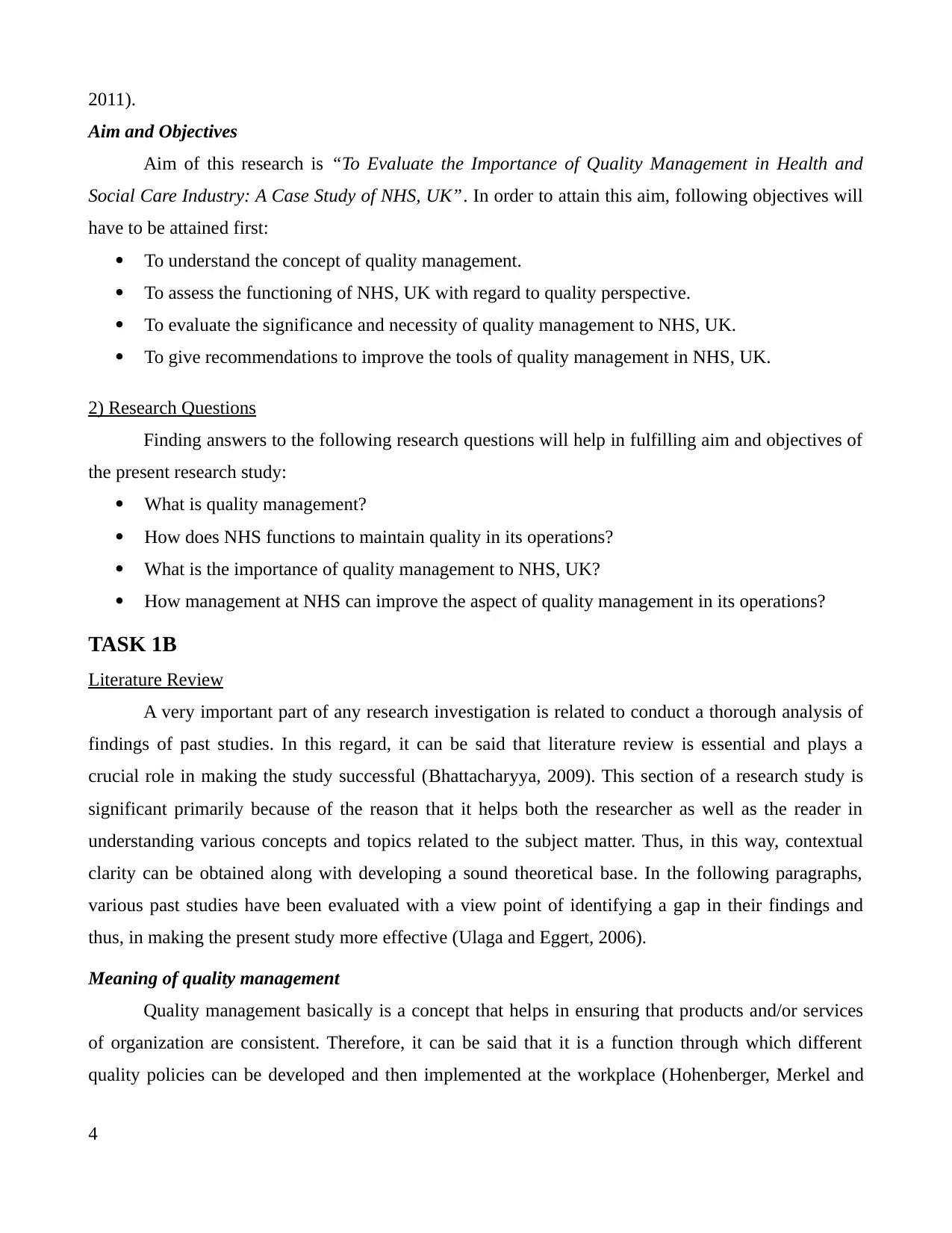
2011).
Aim and Objectives
Aim of this research is “To Evaluate the Importance of Quality Management in Health and
Social Care Industry: A Case Study of NHS, UK”. In order to attain this aim, following objectives will
have to be attained first:
To understand the concept of quality management.
To assess the functioning of NHS, UK with regard to quality perspective.
To evaluate the significance and necessity of quality management to NHS, UK.
To give recommendations to improve the tools of quality management in NHS, UK.
2) Research Questions
Finding answers to the following research questions will help in fulfilling aim and objectives of
the present research study:
What is quality management?
How does NHS functions to maintain quality in its operations?
What is the importance of quality management to NHS, UK?
How management at NHS can improve the aspect of quality management in its operations?
TASK 1B
Literature Review
A very important part of any research investigation is related to conduct a thorough analysis of
findings of past studies. In this regard, it can be said that literature review is essential and plays a
crucial role in making the study successful (Bhattacharyya, 2009). This section of a research study is
significant primarily because of the reason that it helps both the researcher as well as the reader in
understanding various concepts and topics related to the subject matter. Thus, in this way, contextual
clarity can be obtained along with developing a sound theoretical base. In the following paragraphs,
various past studies have been evaluated with a view point of identifying a gap in their findings and
thus, in making the present study more effective (Ulaga and Eggert, 2006).
Meaning of quality management
Quality management basically is a concept that helps in ensuring that products and/or services
of organization are consistent. Therefore, it can be said that it is a function through which different
quality policies can be developed and then implemented at the workplace (Hohenberger, Merkel and
4
Aim and Objectives
Aim of this research is “To Evaluate the Importance of Quality Management in Health and
Social Care Industry: A Case Study of NHS, UK”. In order to attain this aim, following objectives will
have to be attained first:
To understand the concept of quality management.
To assess the functioning of NHS, UK with regard to quality perspective.
To evaluate the significance and necessity of quality management to NHS, UK.
To give recommendations to improve the tools of quality management in NHS, UK.
2) Research Questions
Finding answers to the following research questions will help in fulfilling aim and objectives of
the present research study:
What is quality management?
How does NHS functions to maintain quality in its operations?
What is the importance of quality management to NHS, UK?
How management at NHS can improve the aspect of quality management in its operations?
TASK 1B
Literature Review
A very important part of any research investigation is related to conduct a thorough analysis of
findings of past studies. In this regard, it can be said that literature review is essential and plays a
crucial role in making the study successful (Bhattacharyya, 2009). This section of a research study is
significant primarily because of the reason that it helps both the researcher as well as the reader in
understanding various concepts and topics related to the subject matter. Thus, in this way, contextual
clarity can be obtained along with developing a sound theoretical base. In the following paragraphs,
various past studies have been evaluated with a view point of identifying a gap in their findings and
thus, in making the present study more effective (Ulaga and Eggert, 2006).
Meaning of quality management
Quality management basically is a concept that helps in ensuring that products and/or services
of organization are consistent. Therefore, it can be said that it is a function through which different
quality policies can be developed and then implemented at the workplace (Hohenberger, Merkel and
4
Paraphrase This Document
Need a fresh take? Get an instant paraphrase of this document with our AI Paraphraser
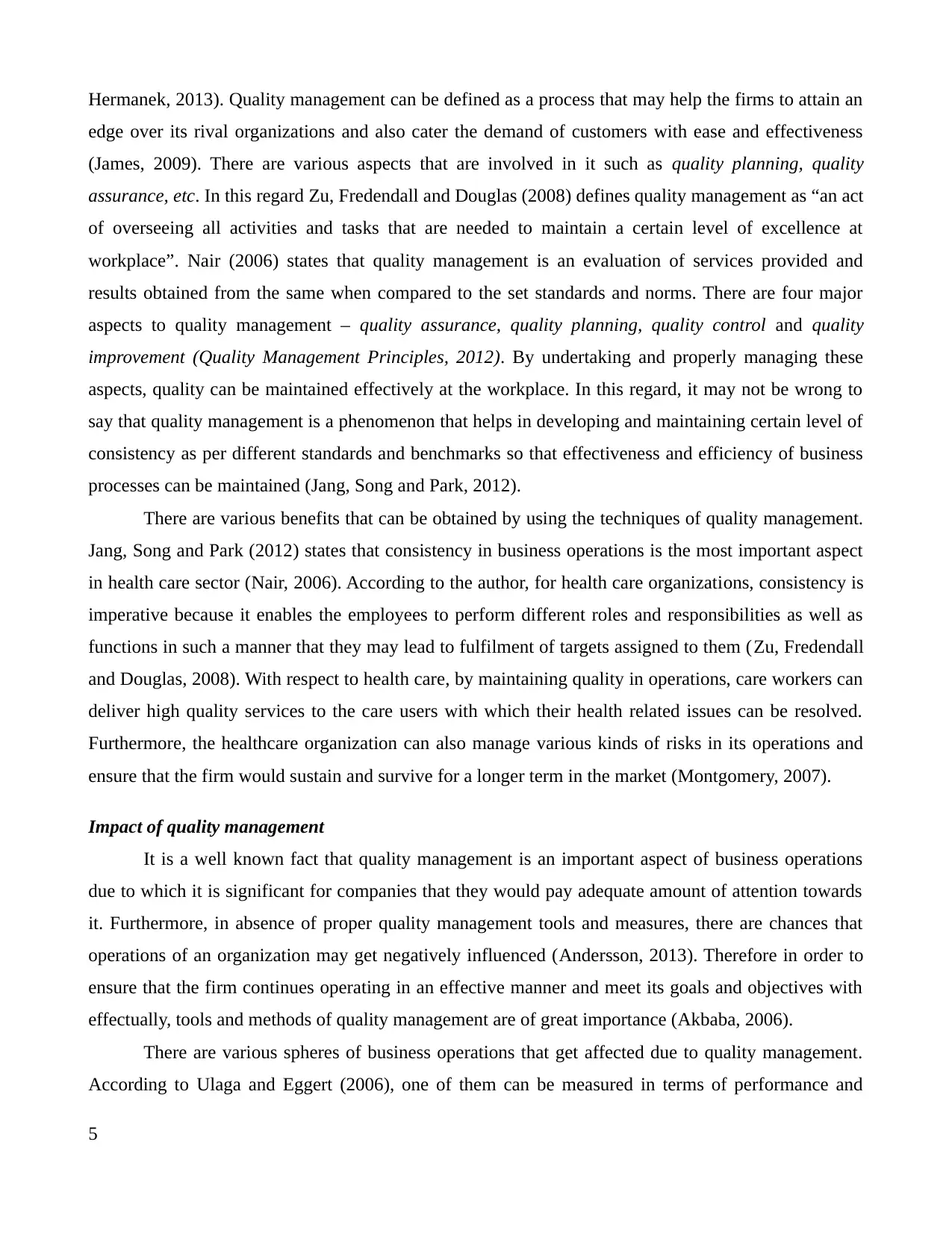
Hermanek, 2013). Quality management can be defined as a process that may help the firms to attain an
edge over its rival organizations and also cater the demand of customers with ease and effectiveness
(James, 2009). There are various aspects that are involved in it such as quality planning, quality
assurance, etc. In this regard Zu, Fredendall and Douglas (2008) defines quality management as “an act
of overseeing all activities and tasks that are needed to maintain a certain level of excellence at
workplace”. Nair (2006) states that quality management is an evaluation of services provided and
results obtained from the same when compared to the set standards and norms. There are four major
aspects to quality management – quality assurance, quality planning, quality control and quality
improvement (Quality Management Principles, 2012). By undertaking and properly managing these
aspects, quality can be maintained effectively at the workplace. In this regard, it may not be wrong to
say that quality management is a phenomenon that helps in developing and maintaining certain level of
consistency as per different standards and benchmarks so that effectiveness and efficiency of business
processes can be maintained (Jang, Song and Park, 2012).
There are various benefits that can be obtained by using the techniques of quality management.
Jang, Song and Park (2012) states that consistency in business operations is the most important aspect
in health care sector (Nair, 2006). According to the author, for health care organizations, consistency is
imperative because it enables the employees to perform different roles and responsibilities as well as
functions in such a manner that they may lead to fulfilment of targets assigned to them (Zu, Fredendall
and Douglas, 2008). With respect to health care, by maintaining quality in operations, care workers can
deliver high quality services to the care users with which their health related issues can be resolved.
Furthermore, the healthcare organization can also manage various kinds of risks in its operations and
ensure that the firm would sustain and survive for a longer term in the market (Montgomery, 2007).
Impact of quality management
It is a well known fact that quality management is an important aspect of business operations
due to which it is significant for companies that they would pay adequate amount of attention towards
it. Furthermore, in absence of proper quality management tools and measures, there are chances that
operations of an organization may get negatively influenced (Andersson, 2013). Therefore in order to
ensure that the firm continues operating in an effective manner and meet its goals and objectives with
effectually, tools and methods of quality management are of great importance (Akbaba, 2006).
There are various spheres of business operations that get affected due to quality management.
According to Ulaga and Eggert (2006), one of them can be measured in terms of performance and
5
edge over its rival organizations and also cater the demand of customers with ease and effectiveness
(James, 2009). There are various aspects that are involved in it such as quality planning, quality
assurance, etc. In this regard Zu, Fredendall and Douglas (2008) defines quality management as “an act
of overseeing all activities and tasks that are needed to maintain a certain level of excellence at
workplace”. Nair (2006) states that quality management is an evaluation of services provided and
results obtained from the same when compared to the set standards and norms. There are four major
aspects to quality management – quality assurance, quality planning, quality control and quality
improvement (Quality Management Principles, 2012). By undertaking and properly managing these
aspects, quality can be maintained effectively at the workplace. In this regard, it may not be wrong to
say that quality management is a phenomenon that helps in developing and maintaining certain level of
consistency as per different standards and benchmarks so that effectiveness and efficiency of business
processes can be maintained (Jang, Song and Park, 2012).
There are various benefits that can be obtained by using the techniques of quality management.
Jang, Song and Park (2012) states that consistency in business operations is the most important aspect
in health care sector (Nair, 2006). According to the author, for health care organizations, consistency is
imperative because it enables the employees to perform different roles and responsibilities as well as
functions in such a manner that they may lead to fulfilment of targets assigned to them (Zu, Fredendall
and Douglas, 2008). With respect to health care, by maintaining quality in operations, care workers can
deliver high quality services to the care users with which their health related issues can be resolved.
Furthermore, the healthcare organization can also manage various kinds of risks in its operations and
ensure that the firm would sustain and survive for a longer term in the market (Montgomery, 2007).
Impact of quality management
It is a well known fact that quality management is an important aspect of business operations
due to which it is significant for companies that they would pay adequate amount of attention towards
it. Furthermore, in absence of proper quality management tools and measures, there are chances that
operations of an organization may get negatively influenced (Andersson, 2013). Therefore in order to
ensure that the firm continues operating in an effective manner and meet its goals and objectives with
effectually, tools and methods of quality management are of great importance (Akbaba, 2006).
There are various spheres of business operations that get affected due to quality management.
According to Ulaga and Eggert (2006), one of them can be measured in terms of performance and
5
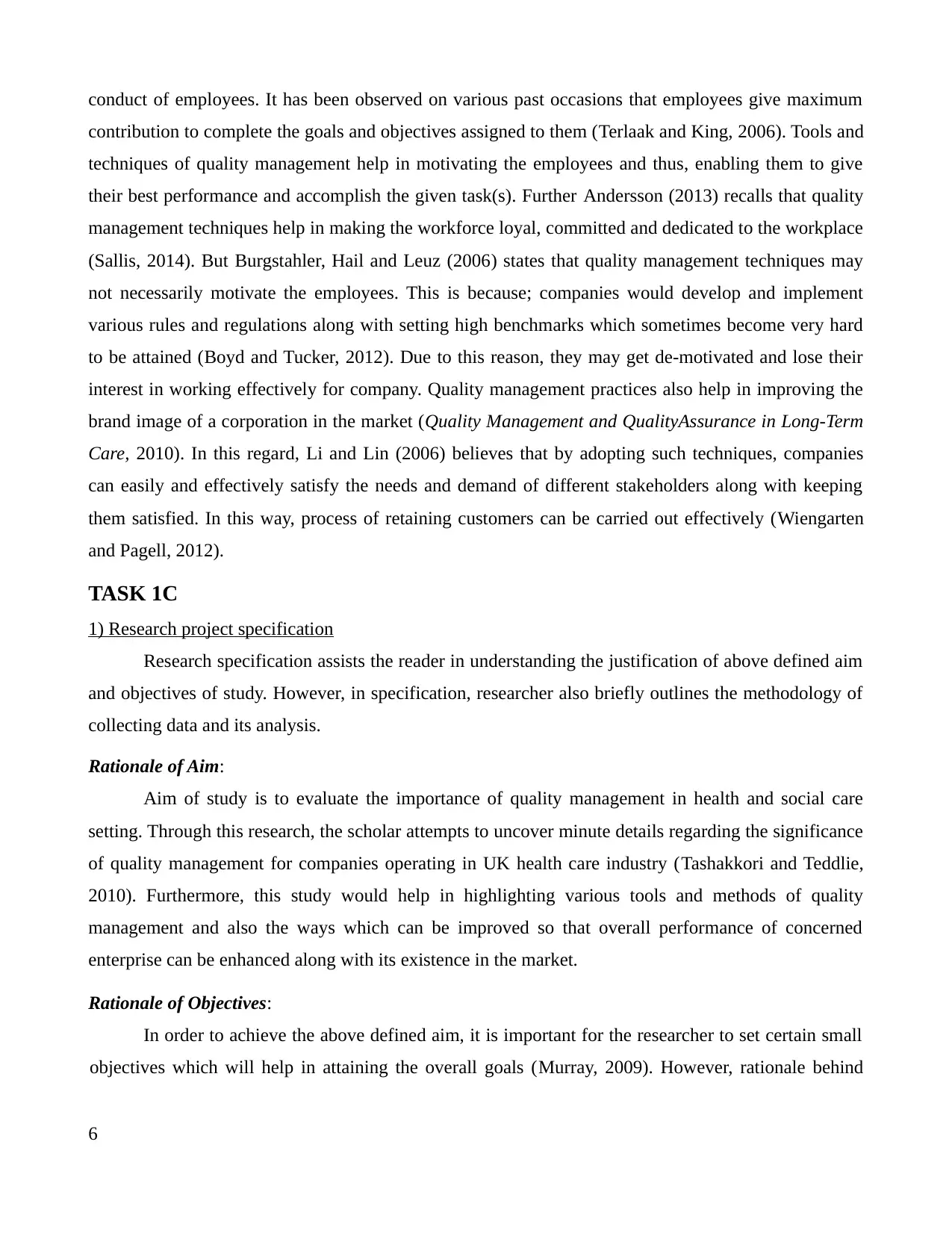
conduct of employees. It has been observed on various past occasions that employees give maximum
contribution to complete the goals and objectives assigned to them (Terlaak and King, 2006). Tools and
techniques of quality management help in motivating the employees and thus, enabling them to give
their best performance and accomplish the given task(s). Further Andersson (2013) recalls that quality
management techniques help in making the workforce loyal, committed and dedicated to the workplace
(Sallis, 2014). But Burgstahler, Hail and Leuz (2006) states that quality management techniques may
not necessarily motivate the employees. This is because; companies would develop and implement
various rules and regulations along with setting high benchmarks which sometimes become very hard
to be attained (Boyd and Tucker, 2012). Due to this reason, they may get de-motivated and lose their
interest in working effectively for company. Quality management practices also help in improving the
brand image of a corporation in the market (Quality Management and QualityAssurance in Long-Term
Care, 2010). In this regard, Li and Lin (2006) believes that by adopting such techniques, companies
can easily and effectively satisfy the needs and demand of different stakeholders along with keeping
them satisfied. In this way, process of retaining customers can be carried out effectively (Wiengarten
and Pagell, 2012).
TASK 1C
1) Research project specification
Research specification assists the reader in understanding the justification of above defined aim
and objectives of study. However, in specification, researcher also briefly outlines the methodology of
collecting data and its analysis.
Rationale of Aim:
Aim of study is to evaluate the importance of quality management in health and social care
setting. Through this research, the scholar attempts to uncover minute details regarding the significance
of quality management for companies operating in UK health care industry (Tashakkori and Teddlie,
2010). Furthermore, this study would help in highlighting various tools and methods of quality
management and also the ways which can be improved so that overall performance of concerned
enterprise can be enhanced along with its existence in the market.
Rationale of Objectives:
In order to achieve the above defined aim, it is important for the researcher to set certain small
objectives which will help in attaining the overall goals (Murray, 2009). However, rationale behind
6
contribution to complete the goals and objectives assigned to them (Terlaak and King, 2006). Tools and
techniques of quality management help in motivating the employees and thus, enabling them to give
their best performance and accomplish the given task(s). Further Andersson (2013) recalls that quality
management techniques help in making the workforce loyal, committed and dedicated to the workplace
(Sallis, 2014). But Burgstahler, Hail and Leuz (2006) states that quality management techniques may
not necessarily motivate the employees. This is because; companies would develop and implement
various rules and regulations along with setting high benchmarks which sometimes become very hard
to be attained (Boyd and Tucker, 2012). Due to this reason, they may get de-motivated and lose their
interest in working effectively for company. Quality management practices also help in improving the
brand image of a corporation in the market (Quality Management and QualityAssurance in Long-Term
Care, 2010). In this regard, Li and Lin (2006) believes that by adopting such techniques, companies
can easily and effectively satisfy the needs and demand of different stakeholders along with keeping
them satisfied. In this way, process of retaining customers can be carried out effectively (Wiengarten
and Pagell, 2012).
TASK 1C
1) Research project specification
Research specification assists the reader in understanding the justification of above defined aim
and objectives of study. However, in specification, researcher also briefly outlines the methodology of
collecting data and its analysis.
Rationale of Aim:
Aim of study is to evaluate the importance of quality management in health and social care
setting. Through this research, the scholar attempts to uncover minute details regarding the significance
of quality management for companies operating in UK health care industry (Tashakkori and Teddlie,
2010). Furthermore, this study would help in highlighting various tools and methods of quality
management and also the ways which can be improved so that overall performance of concerned
enterprise can be enhanced along with its existence in the market.
Rationale of Objectives:
In order to achieve the above defined aim, it is important for the researcher to set certain small
objectives which will help in attaining the overall goals (Murray, 2009). However, rationale behind
6
⊘ This is a preview!⊘
Do you want full access?
Subscribe today to unlock all pages.

Trusted by 1+ million students worldwide
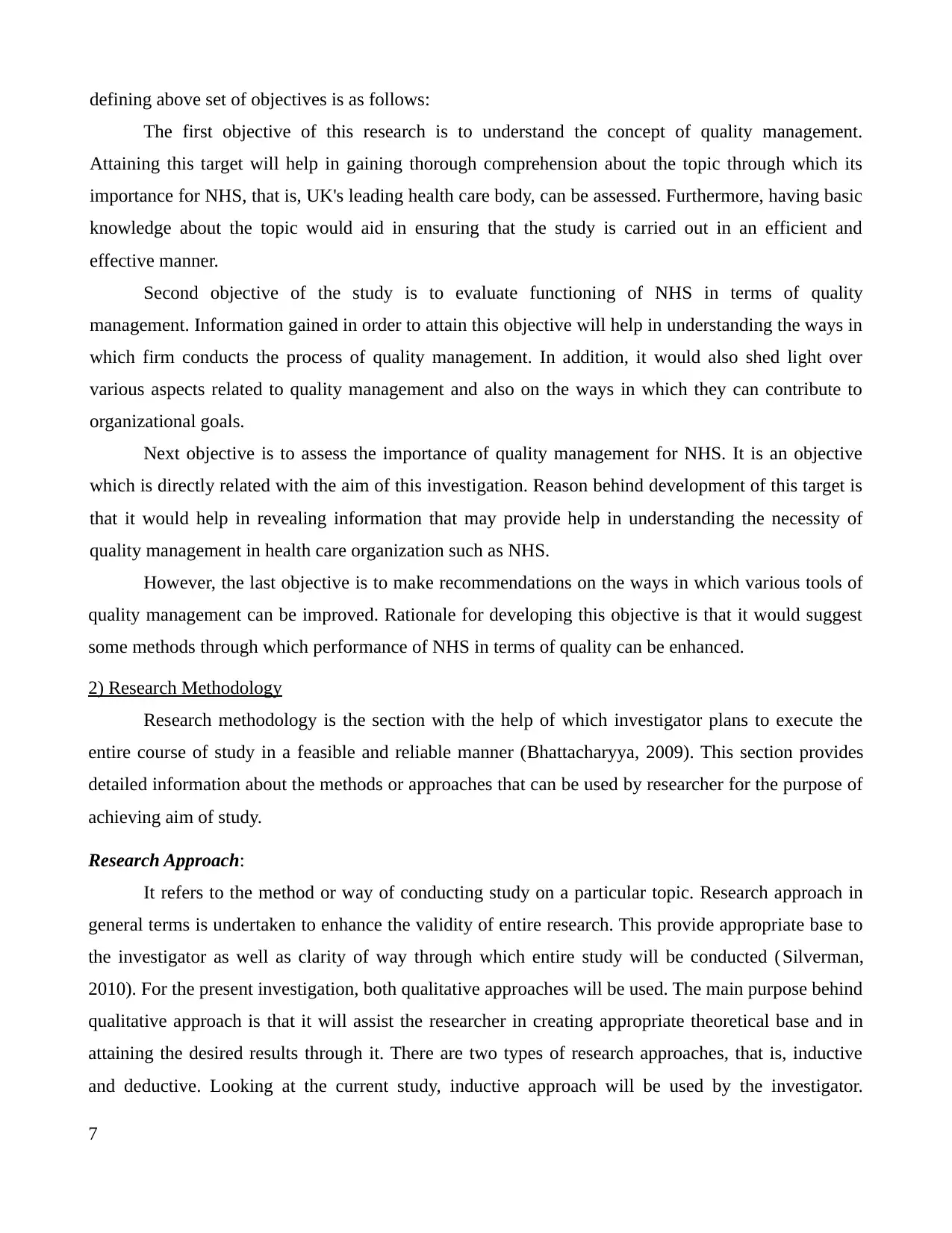
defining above set of objectives is as follows:
The first objective of this research is to understand the concept of quality management.
Attaining this target will help in gaining thorough comprehension about the topic through which its
importance for NHS, that is, UK's leading health care body, can be assessed. Furthermore, having basic
knowledge about the topic would aid in ensuring that the study is carried out in an efficient and
effective manner.
Second objective of the study is to evaluate functioning of NHS in terms of quality
management. Information gained in order to attain this objective will help in understanding the ways in
which firm conducts the process of quality management. In addition, it would also shed light over
various aspects related to quality management and also on the ways in which they can contribute to
organizational goals.
Next objective is to assess the importance of quality management for NHS. It is an objective
which is directly related with the aim of this investigation. Reason behind development of this target is
that it would help in revealing information that may provide help in understanding the necessity of
quality management in health care organization such as NHS.
However, the last objective is to make recommendations on the ways in which various tools of
quality management can be improved. Rationale for developing this objective is that it would suggest
some methods through which performance of NHS in terms of quality can be enhanced.
2) Research Methodology
Research methodology is the section with the help of which investigator plans to execute the
entire course of study in a feasible and reliable manner (Bhattacharyya, 2009). This section provides
detailed information about the methods or approaches that can be used by researcher for the purpose of
achieving aim of study.
Research Approach:
It refers to the method or way of conducting study on a particular topic. Research approach in
general terms is undertaken to enhance the validity of entire research. This provide appropriate base to
the investigator as well as clarity of way through which entire study will be conducted (Silverman,
2010). For the present investigation, both qualitative approaches will be used. The main purpose behind
qualitative approach is that it will assist the researcher in creating appropriate theoretical base and in
attaining the desired results through it. There are two types of research approaches, that is, inductive
and deductive. Looking at the current study, inductive approach will be used by the investigator.
7
The first objective of this research is to understand the concept of quality management.
Attaining this target will help in gaining thorough comprehension about the topic through which its
importance for NHS, that is, UK's leading health care body, can be assessed. Furthermore, having basic
knowledge about the topic would aid in ensuring that the study is carried out in an efficient and
effective manner.
Second objective of the study is to evaluate functioning of NHS in terms of quality
management. Information gained in order to attain this objective will help in understanding the ways in
which firm conducts the process of quality management. In addition, it would also shed light over
various aspects related to quality management and also on the ways in which they can contribute to
organizational goals.
Next objective is to assess the importance of quality management for NHS. It is an objective
which is directly related with the aim of this investigation. Reason behind development of this target is
that it would help in revealing information that may provide help in understanding the necessity of
quality management in health care organization such as NHS.
However, the last objective is to make recommendations on the ways in which various tools of
quality management can be improved. Rationale for developing this objective is that it would suggest
some methods through which performance of NHS in terms of quality can be enhanced.
2) Research Methodology
Research methodology is the section with the help of which investigator plans to execute the
entire course of study in a feasible and reliable manner (Bhattacharyya, 2009). This section provides
detailed information about the methods or approaches that can be used by researcher for the purpose of
achieving aim of study.
Research Approach:
It refers to the method or way of conducting study on a particular topic. Research approach in
general terms is undertaken to enhance the validity of entire research. This provide appropriate base to
the investigator as well as clarity of way through which entire study will be conducted (Silverman,
2010). For the present investigation, both qualitative approaches will be used. The main purpose behind
qualitative approach is that it will assist the researcher in creating appropriate theoretical base and in
attaining the desired results through it. There are two types of research approaches, that is, inductive
and deductive. Looking at the current study, inductive approach will be used by the investigator.
7
Paraphrase This Document
Need a fresh take? Get an instant paraphrase of this document with our AI Paraphraser
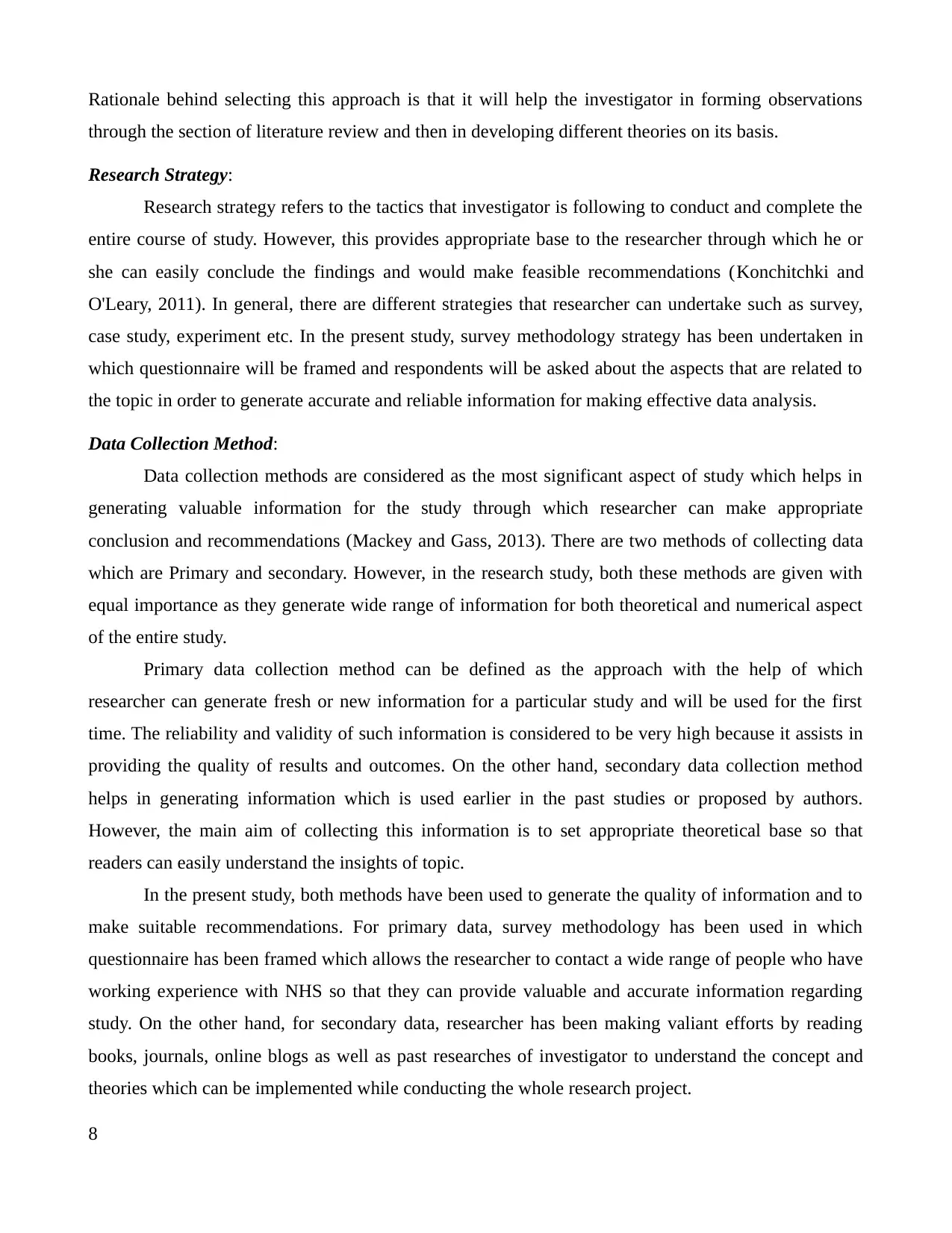
Rationale behind selecting this approach is that it will help the investigator in forming observations
through the section of literature review and then in developing different theories on its basis.
Research Strategy:
Research strategy refers to the tactics that investigator is following to conduct and complete the
entire course of study. However, this provides appropriate base to the researcher through which he or
she can easily conclude the findings and would make feasible recommendations (Konchitchki and
O'Leary, 2011). In general, there are different strategies that researcher can undertake such as survey,
case study, experiment etc. In the present study, survey methodology strategy has been undertaken in
which questionnaire will be framed and respondents will be asked about the aspects that are related to
the topic in order to generate accurate and reliable information for making effective data analysis.
Data Collection Method:
Data collection methods are considered as the most significant aspect of study which helps in
generating valuable information for the study through which researcher can make appropriate
conclusion and recommendations (Mackey and Gass, 2013). There are two methods of collecting data
which are Primary and secondary. However, in the research study, both these methods are given with
equal importance as they generate wide range of information for both theoretical and numerical aspect
of the entire study.
Primary data collection method can be defined as the approach with the help of which
researcher can generate fresh or new information for a particular study and will be used for the first
time. The reliability and validity of such information is considered to be very high because it assists in
providing the quality of results and outcomes. On the other hand, secondary data collection method
helps in generating information which is used earlier in the past studies or proposed by authors.
However, the main aim of collecting this information is to set appropriate theoretical base so that
readers can easily understand the insights of topic.
In the present study, both methods have been used to generate the quality of information and to
make suitable recommendations. For primary data, survey methodology has been used in which
questionnaire has been framed which allows the researcher to contact a wide range of people who have
working experience with NHS so that they can provide valuable and accurate information regarding
study. On the other hand, for secondary data, researcher has been making valiant efforts by reading
books, journals, online blogs as well as past researches of investigator to understand the concept and
theories which can be implemented while conducting the whole research project.
8
through the section of literature review and then in developing different theories on its basis.
Research Strategy:
Research strategy refers to the tactics that investigator is following to conduct and complete the
entire course of study. However, this provides appropriate base to the researcher through which he or
she can easily conclude the findings and would make feasible recommendations (Konchitchki and
O'Leary, 2011). In general, there are different strategies that researcher can undertake such as survey,
case study, experiment etc. In the present study, survey methodology strategy has been undertaken in
which questionnaire will be framed and respondents will be asked about the aspects that are related to
the topic in order to generate accurate and reliable information for making effective data analysis.
Data Collection Method:
Data collection methods are considered as the most significant aspect of study which helps in
generating valuable information for the study through which researcher can make appropriate
conclusion and recommendations (Mackey and Gass, 2013). There are two methods of collecting data
which are Primary and secondary. However, in the research study, both these methods are given with
equal importance as they generate wide range of information for both theoretical and numerical aspect
of the entire study.
Primary data collection method can be defined as the approach with the help of which
researcher can generate fresh or new information for a particular study and will be used for the first
time. The reliability and validity of such information is considered to be very high because it assists in
providing the quality of results and outcomes. On the other hand, secondary data collection method
helps in generating information which is used earlier in the past studies or proposed by authors.
However, the main aim of collecting this information is to set appropriate theoretical base so that
readers can easily understand the insights of topic.
In the present study, both methods have been used to generate the quality of information and to
make suitable recommendations. For primary data, survey methodology has been used in which
questionnaire has been framed which allows the researcher to contact a wide range of people who have
working experience with NHS so that they can provide valuable and accurate information regarding
study. On the other hand, for secondary data, researcher has been making valiant efforts by reading
books, journals, online blogs as well as past researches of investigator to understand the concept and
theories which can be implemented while conducting the whole research project.
8
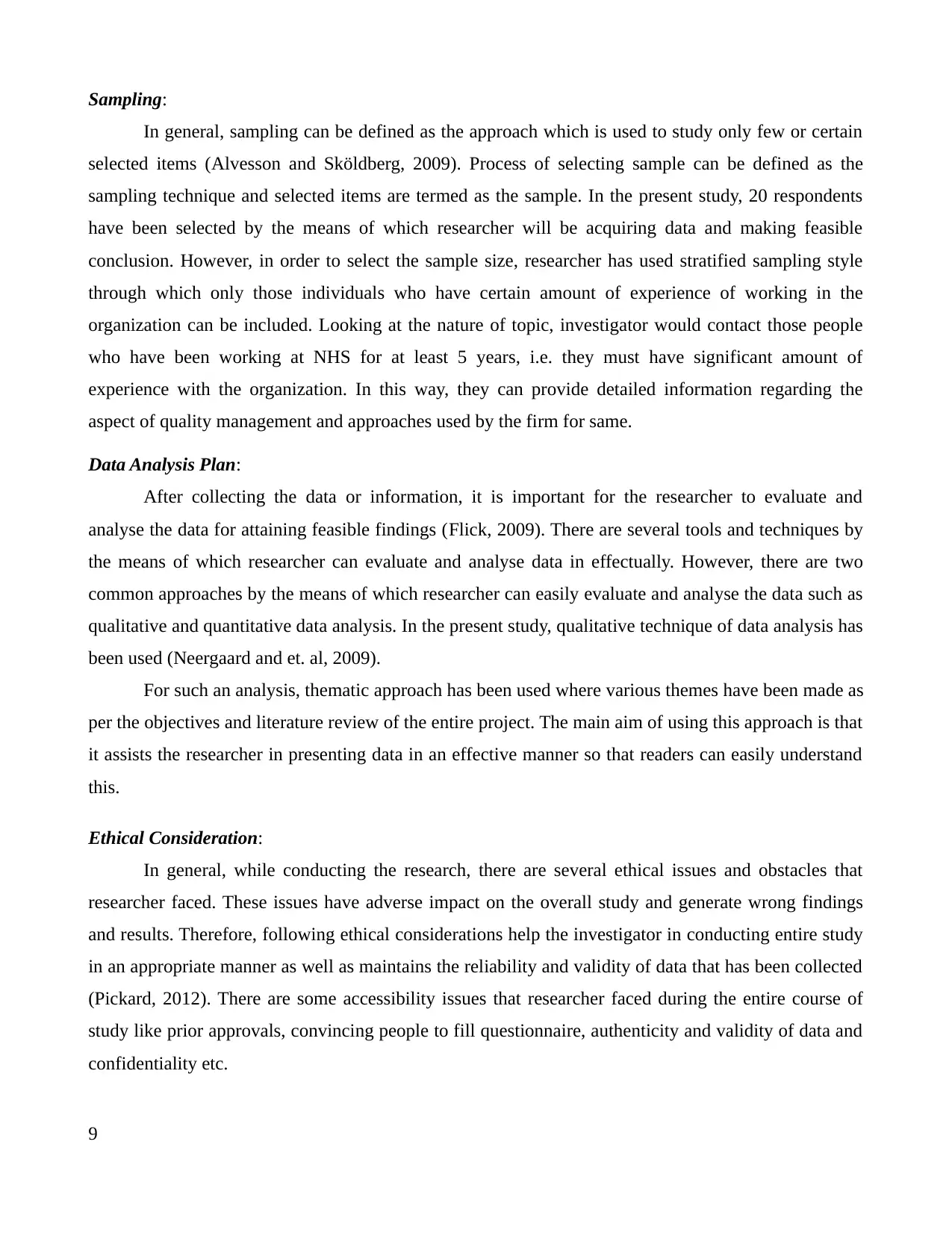
Sampling:
In general, sampling can be defined as the approach which is used to study only few or certain
selected items (Alvesson and Sköldberg, 2009). Process of selecting sample can be defined as the
sampling technique and selected items are termed as the sample. In the present study, 20 respondents
have been selected by the means of which researcher will be acquiring data and making feasible
conclusion. However, in order to select the sample size, researcher has used stratified sampling style
through which only those individuals who have certain amount of experience of working in the
organization can be included. Looking at the nature of topic, investigator would contact those people
who have been working at NHS for at least 5 years, i.e. they must have significant amount of
experience with the organization. In this way, they can provide detailed information regarding the
aspect of quality management and approaches used by the firm for same.
Data Analysis Plan:
After collecting the data or information, it is important for the researcher to evaluate and
analyse the data for attaining feasible findings (Flick, 2009). There are several tools and techniques by
the means of which researcher can evaluate and analyse data in effectually. However, there are two
common approaches by the means of which researcher can easily evaluate and analyse the data such as
qualitative and quantitative data analysis. In the present study, qualitative technique of data analysis has
been used (Neergaard and et. al, 2009).
For such an analysis, thematic approach has been used where various themes have been made as
per the objectives and literature review of the entire project. The main aim of using this approach is that
it assists the researcher in presenting data in an effective manner so that readers can easily understand
this.
Ethical Consideration:
In general, while conducting the research, there are several ethical issues and obstacles that
researcher faced. These issues have adverse impact on the overall study and generate wrong findings
and results. Therefore, following ethical considerations help the investigator in conducting entire study
in an appropriate manner as well as maintains the reliability and validity of data that has been collected
(Pickard, 2012). There are some accessibility issues that researcher faced during the entire course of
study like prior approvals, convincing people to fill questionnaire, authenticity and validity of data and
confidentiality etc.
9
In general, sampling can be defined as the approach which is used to study only few or certain
selected items (Alvesson and Sköldberg, 2009). Process of selecting sample can be defined as the
sampling technique and selected items are termed as the sample. In the present study, 20 respondents
have been selected by the means of which researcher will be acquiring data and making feasible
conclusion. However, in order to select the sample size, researcher has used stratified sampling style
through which only those individuals who have certain amount of experience of working in the
organization can be included. Looking at the nature of topic, investigator would contact those people
who have been working at NHS for at least 5 years, i.e. they must have significant amount of
experience with the organization. In this way, they can provide detailed information regarding the
aspect of quality management and approaches used by the firm for same.
Data Analysis Plan:
After collecting the data or information, it is important for the researcher to evaluate and
analyse the data for attaining feasible findings (Flick, 2009). There are several tools and techniques by
the means of which researcher can evaluate and analyse data in effectually. However, there are two
common approaches by the means of which researcher can easily evaluate and analyse the data such as
qualitative and quantitative data analysis. In the present study, qualitative technique of data analysis has
been used (Neergaard and et. al, 2009).
For such an analysis, thematic approach has been used where various themes have been made as
per the objectives and literature review of the entire project. The main aim of using this approach is that
it assists the researcher in presenting data in an effective manner so that readers can easily understand
this.
Ethical Consideration:
In general, while conducting the research, there are several ethical issues and obstacles that
researcher faced. These issues have adverse impact on the overall study and generate wrong findings
and results. Therefore, following ethical considerations help the investigator in conducting entire study
in an appropriate manner as well as maintains the reliability and validity of data that has been collected
(Pickard, 2012). There are some accessibility issues that researcher faced during the entire course of
study like prior approvals, convincing people to fill questionnaire, authenticity and validity of data and
confidentiality etc.
9
⊘ This is a preview!⊘
Do you want full access?
Subscribe today to unlock all pages.

Trusted by 1+ million students worldwide
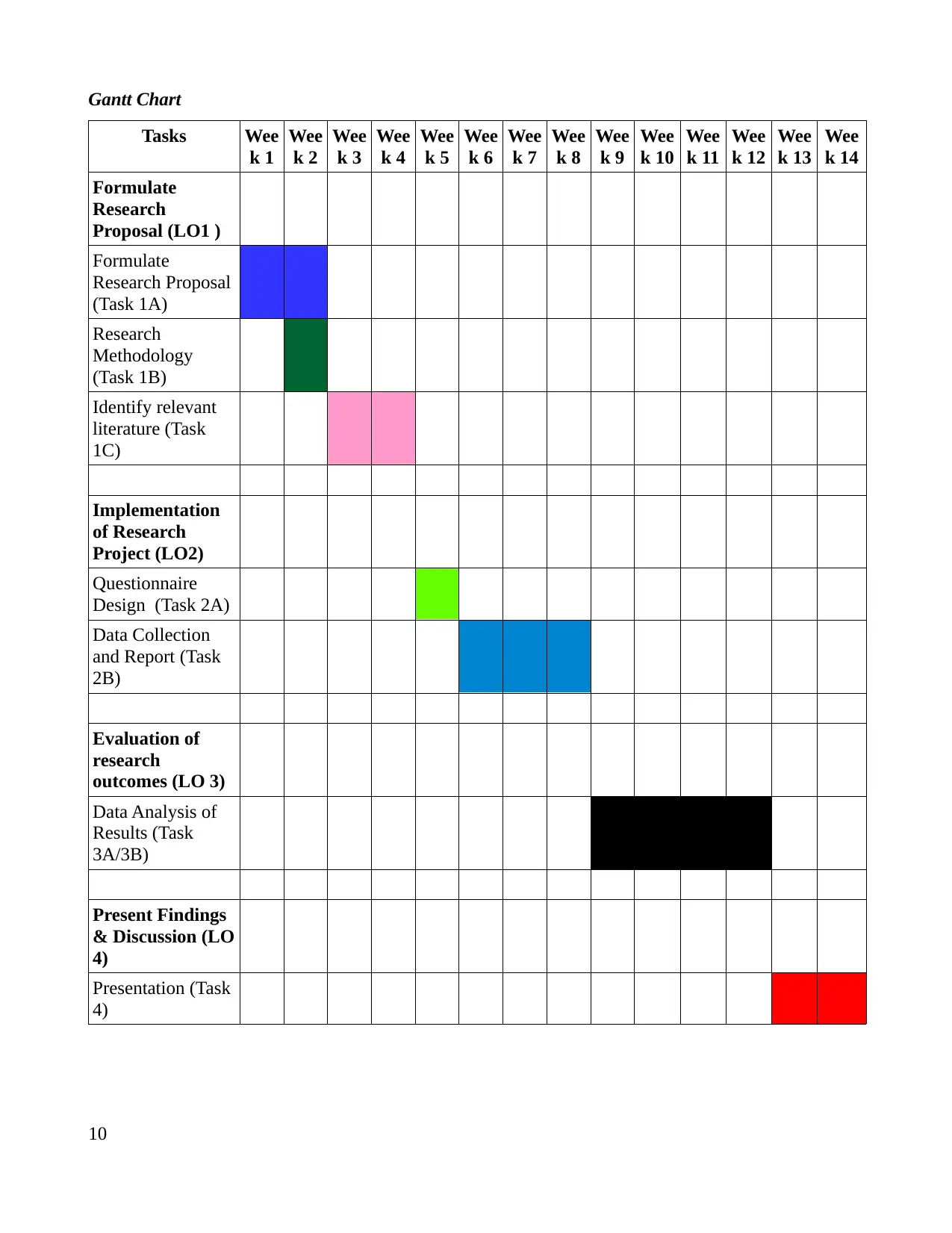
Gantt Chart
Tasks Wee
k 1
Wee
k 2
Wee
k 3
Wee
k 4
Wee
k 5
Wee
k 6
Wee
k 7
Wee
k 8
Wee
k 9
Wee
k 10
Wee
k 11
Wee
k 12
Wee
k 13
Wee
k 14
Formulate
Research
Proposal (LO1 )
Formulate
Research Proposal
(Task 1A)
Research
Methodology
(Task 1B)
Identify relevant
literature (Task
1C)
Implementation
of Research
Project (LO2)
Questionnaire
Design (Task 2A)
Data Collection
and Report (Task
2B)
Evaluation of
research
outcomes (LO 3)
Data Analysis of
Results (Task
3A/3B)
Present Findings
& Discussion (LO
4)
Presentation (Task
4)
10
Tasks Wee
k 1
Wee
k 2
Wee
k 3
Wee
k 4
Wee
k 5
Wee
k 6
Wee
k 7
Wee
k 8
Wee
k 9
Wee
k 10
Wee
k 11
Wee
k 12
Wee
k 13
Wee
k 14
Formulate
Research
Proposal (LO1 )
Formulate
Research Proposal
(Task 1A)
Research
Methodology
(Task 1B)
Identify relevant
literature (Task
1C)
Implementation
of Research
Project (LO2)
Questionnaire
Design (Task 2A)
Data Collection
and Report (Task
2B)
Evaluation of
research
outcomes (LO 3)
Data Analysis of
Results (Task
3A/3B)
Present Findings
& Discussion (LO
4)
Presentation (Task
4)
10
Paraphrase This Document
Need a fresh take? Get an instant paraphrase of this document with our AI Paraphraser
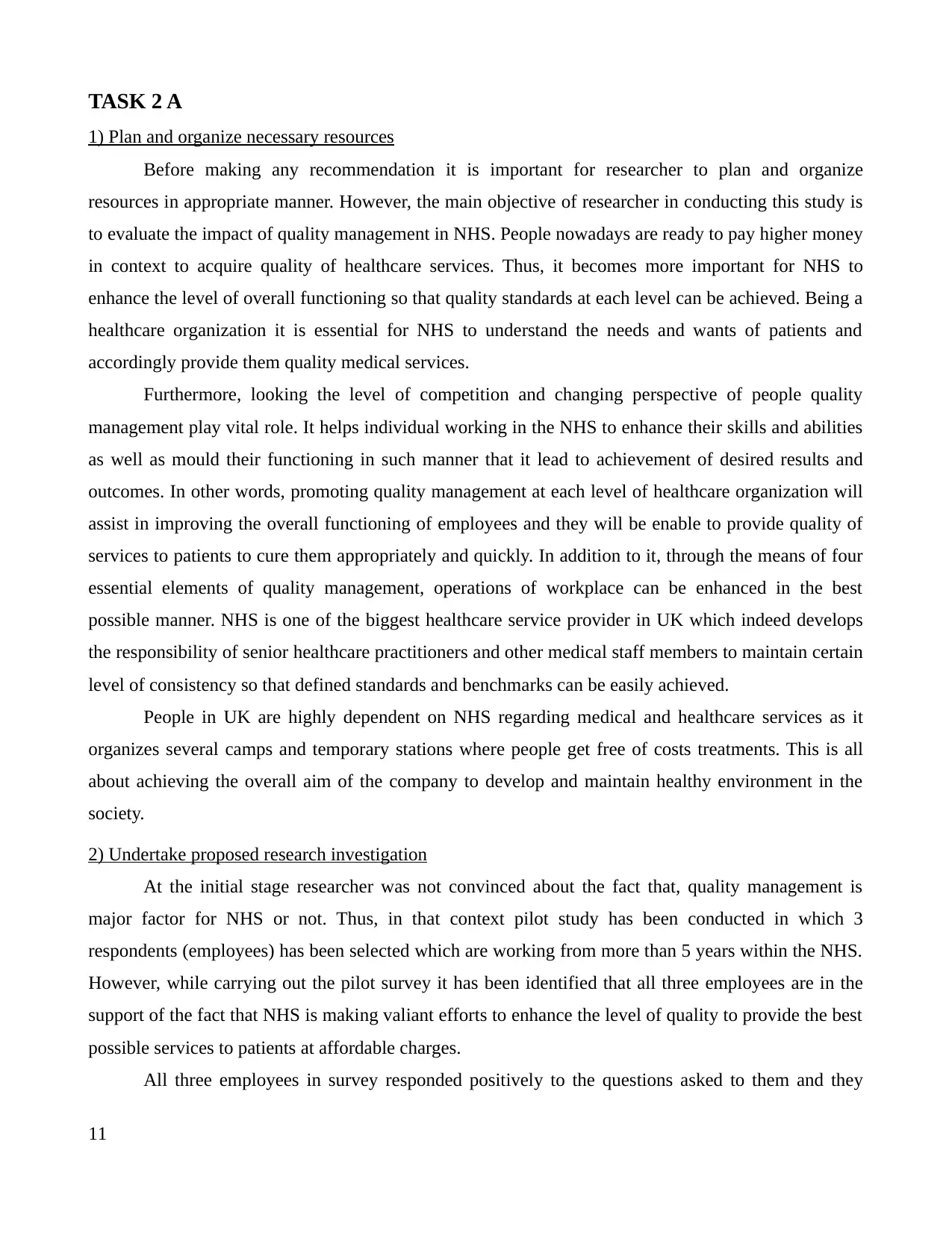
TASK 2 A
1) Plan and organize necessary resources
Before making any recommendation it is important for researcher to plan and organize
resources in appropriate manner. However, the main objective of researcher in conducting this study is
to evaluate the impact of quality management in NHS. People nowadays are ready to pay higher money
in context to acquire quality of healthcare services. Thus, it becomes more important for NHS to
enhance the level of overall functioning so that quality standards at each level can be achieved. Being a
healthcare organization it is essential for NHS to understand the needs and wants of patients and
accordingly provide them quality medical services.
Furthermore, looking the level of competition and changing perspective of people quality
management play vital role. It helps individual working in the NHS to enhance their skills and abilities
as well as mould their functioning in such manner that it lead to achievement of desired results and
outcomes. In other words, promoting quality management at each level of healthcare organization will
assist in improving the overall functioning of employees and they will be enable to provide quality of
services to patients to cure them appropriately and quickly. In addition to it, through the means of four
essential elements of quality management, operations of workplace can be enhanced in the best
possible manner. NHS is one of the biggest healthcare service provider in UK which indeed develops
the responsibility of senior healthcare practitioners and other medical staff members to maintain certain
level of consistency so that defined standards and benchmarks can be easily achieved.
People in UK are highly dependent on NHS regarding medical and healthcare services as it
organizes several camps and temporary stations where people get free of costs treatments. This is all
about achieving the overall aim of the company to develop and maintain healthy environment in the
society.
2) Undertake proposed research investigation
At the initial stage researcher was not convinced about the fact that, quality management is
major factor for NHS or not. Thus, in that context pilot study has been conducted in which 3
respondents (employees) has been selected which are working from more than 5 years within the NHS.
However, while carrying out the pilot survey it has been identified that all three employees are in the
support of the fact that NHS is making valiant efforts to enhance the level of quality to provide the best
possible services to patients at affordable charges.
All three employees in survey responded positively to the questions asked to them and they
11
1) Plan and organize necessary resources
Before making any recommendation it is important for researcher to plan and organize
resources in appropriate manner. However, the main objective of researcher in conducting this study is
to evaluate the impact of quality management in NHS. People nowadays are ready to pay higher money
in context to acquire quality of healthcare services. Thus, it becomes more important for NHS to
enhance the level of overall functioning so that quality standards at each level can be achieved. Being a
healthcare organization it is essential for NHS to understand the needs and wants of patients and
accordingly provide them quality medical services.
Furthermore, looking the level of competition and changing perspective of people quality
management play vital role. It helps individual working in the NHS to enhance their skills and abilities
as well as mould their functioning in such manner that it lead to achievement of desired results and
outcomes. In other words, promoting quality management at each level of healthcare organization will
assist in improving the overall functioning of employees and they will be enable to provide quality of
services to patients to cure them appropriately and quickly. In addition to it, through the means of four
essential elements of quality management, operations of workplace can be enhanced in the best
possible manner. NHS is one of the biggest healthcare service provider in UK which indeed develops
the responsibility of senior healthcare practitioners and other medical staff members to maintain certain
level of consistency so that defined standards and benchmarks can be easily achieved.
People in UK are highly dependent on NHS regarding medical and healthcare services as it
organizes several camps and temporary stations where people get free of costs treatments. This is all
about achieving the overall aim of the company to develop and maintain healthy environment in the
society.
2) Undertake proposed research investigation
At the initial stage researcher was not convinced about the fact that, quality management is
major factor for NHS or not. Thus, in that context pilot study has been conducted in which 3
respondents (employees) has been selected which are working from more than 5 years within the NHS.
However, while carrying out the pilot survey it has been identified that all three employees are in the
support of the fact that NHS is making valiant efforts to enhance the level of quality to provide the best
possible services to patients at affordable charges.
All three employees in survey responded positively to the questions asked to them and they
11
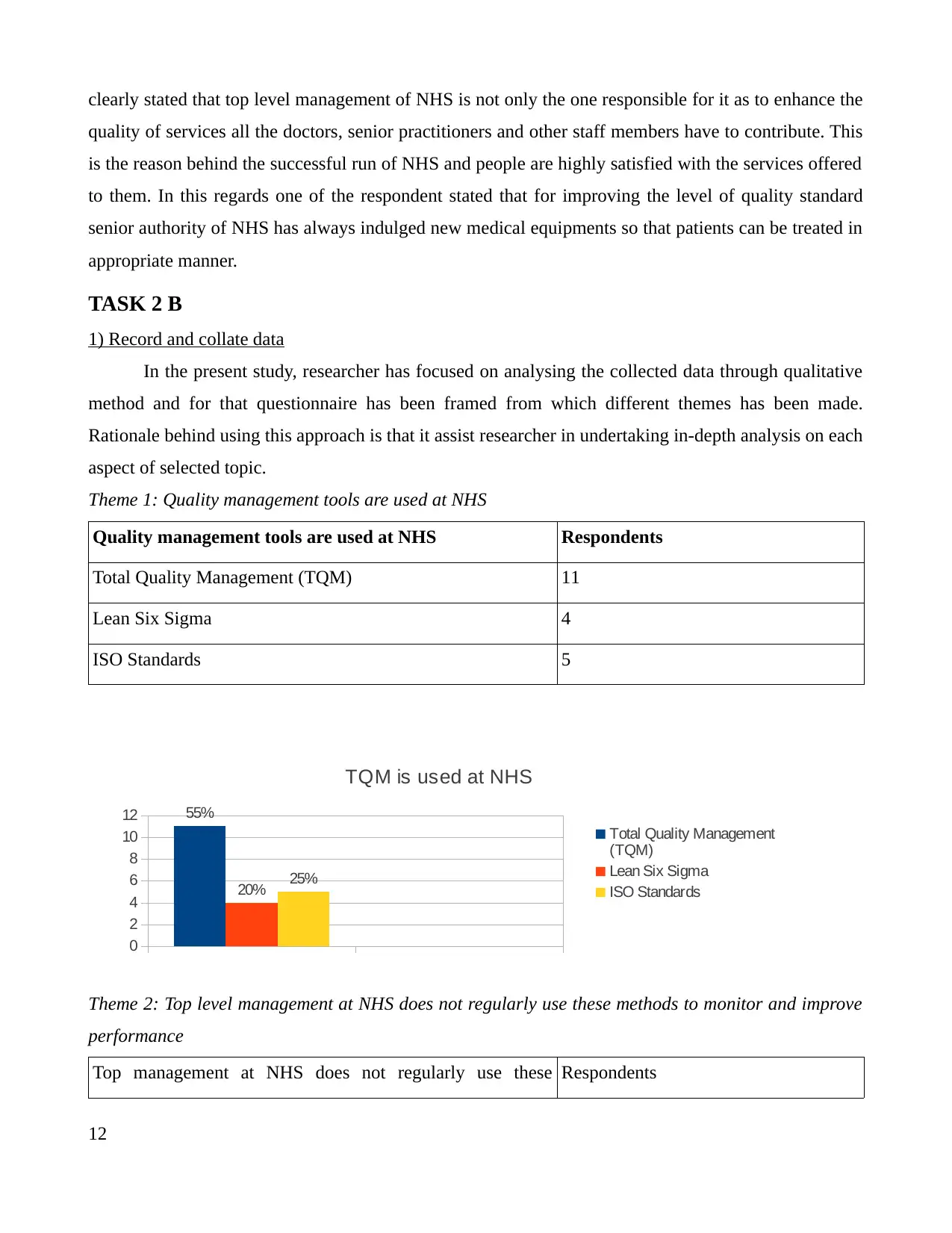
clearly stated that top level management of NHS is not only the one responsible for it as to enhance the
quality of services all the doctors, senior practitioners and other staff members have to contribute. This
is the reason behind the successful run of NHS and people are highly satisfied with the services offered
to them. In this regards one of the respondent stated that for improving the level of quality standard
senior authority of NHS has always indulged new medical equipments so that patients can be treated in
appropriate manner.
TASK 2 B
1) Record and collate data
In the present study, researcher has focused on analysing the collected data through qualitative
method and for that questionnaire has been framed from which different themes has been made.
Rationale behind using this approach is that it assist researcher in undertaking in-depth analysis on each
aspect of selected topic.
Theme 1: Quality management tools are used at NHS
Quality management tools are used at NHS Respondents
Total Quality Management (TQM) 11
Lean Six Sigma 4
ISO Standards 5
0
2
4
6
8
10
12 55%
20% 25%
TQM is used at NHS
Total Quality Management
(TQM)
Lean Six Sigma
ISO Standards
Theme 2: Top level management at NHS does not regularly use these methods to monitor and improve
performance
Top management at NHS does not regularly use these Respondents
12
quality of services all the doctors, senior practitioners and other staff members have to contribute. This
is the reason behind the successful run of NHS and people are highly satisfied with the services offered
to them. In this regards one of the respondent stated that for improving the level of quality standard
senior authority of NHS has always indulged new medical equipments so that patients can be treated in
appropriate manner.
TASK 2 B
1) Record and collate data
In the present study, researcher has focused on analysing the collected data through qualitative
method and for that questionnaire has been framed from which different themes has been made.
Rationale behind using this approach is that it assist researcher in undertaking in-depth analysis on each
aspect of selected topic.
Theme 1: Quality management tools are used at NHS
Quality management tools are used at NHS Respondents
Total Quality Management (TQM) 11
Lean Six Sigma 4
ISO Standards 5
0
2
4
6
8
10
12 55%
20% 25%
TQM is used at NHS
Total Quality Management
(TQM)
Lean Six Sigma
ISO Standards
Theme 2: Top level management at NHS does not regularly use these methods to monitor and improve
performance
Top management at NHS does not regularly use these Respondents
12
⊘ This is a preview!⊘
Do you want full access?
Subscribe today to unlock all pages.

Trusted by 1+ million students worldwide
1 out of 22
Related Documents
Your All-in-One AI-Powered Toolkit for Academic Success.
+13062052269
info@desklib.com
Available 24*7 on WhatsApp / Email
![[object Object]](/_next/static/media/star-bottom.7253800d.svg)
Unlock your academic potential
Copyright © 2020–2026 A2Z Services. All Rights Reserved. Developed and managed by ZUCOL.





